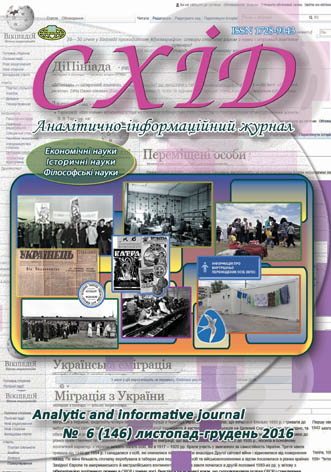Postmetaphysics ontology and pragmatics of philosophical and clinical discourse
DOI:
https://doi.org/10.21847/1728-9343.2016.6(146).91800Keywords:
subject, clinical discourse, philosophical and clinical discourse, identity, careAbstract
The purpose is to identify common and distinctive features of concepts and methodology of the problem of subject within different discourses, implicitly or explicitly relevant to the definition of "clinical" mode of human existence. The research methodology combines techniques of discourse analysis and basic principles of historical and philosophical studies. Scientific novelty of the research lies in definition of the clinical philosophical discourse as a special communicative process, where utterances not only focus on disease syndromes, and reveal phenomenology of inner experience of a pathological self, but also structure a certain type of sociality. Clinical discourse represents the space where the patient is treated not as a subject but as an object of disease. Ontology of clinical discourse prevails over ontology of disease, since its structures determine the notion of disease as such. Categorization of the disease, the idea of disease as a phenomenon subdued to professional authority leads to the idea of the need for patient's isolation from the natural environment and removing him to special social institutions. A great while authenticity of the individual had been determined through the testimony of others and manifestation of one's connection to others; then authenticity begun to establish trough the discourse, which individual was able or obliged to deliver about himself/herself. The clinicist doctrines share the intention to reduce the patient's self to its bodily dimension, while ignoring social determinants of psychological deviations. Conclusions of the study are summarized in the following positions: the current clinical discourse is based on the positivist-biological trend in humanitarian knowledge and it is the basis for the production and reproduction of medical and pharmaceutical repressive ideology; philosophical clinical discourse opens the possibility of overcoming the dominance of purely clinicist discourse; such a transformation is possible only after a paradigm shift in understanding the category of subject.
References
Dijk, T. van (2013), Diskurs i vlast: reprezentatsiia dominirovaniia v iazyke I kommunikatsii [Discourse and Power: Representation of dominance in language and communication], LIBROKOM Publ., Moscow, 344 p.
Jоrgensen, M. (2008), Toriia i metod [Discourse analysis. The theory and method], Humanitarian Center Publ., Kharkiv, 352 p.
Foucault, M. (1996), Volia k istine: po tu storonu znaniia, vlsti i seksualnosti [Will to truth: Beyond the knowledge, power and sexuality], Kastal Publ., Moscow, 448 р. (rus).
Apels, Karl-Otto (2011), Diskursverantwortung, in: Verantwortung im Diskurs, DE GRUYTER, Berlin, Boston; 89-14. DOI: 10.1515/9783110251456.89
Attenborough, F. (2014), Words, Contexts, Politics. Gender and Language, Vol. 8, Issue 2, pр. 137-145. DOI: 10.1558/genl.v8i2.137
Dijk, Teun A. van (2016), Sociocognitive Discourse Studies, available at: http://www.discourses.org/OldArticles/Sociocognitive %20Discourse%20Studies.pdf.
Evans, D. (2015), Language and identity, Bloomsbury, London, 235 p. (eng).
Fairclough, N. (1992), Discourse and social change, Polity Press, Cambridge, 260 p.
Fairclough, N.(2013), Critical discourse analysis: The critical study of language, Routledge, 608 p. DOI: 10.4324/9780203809068
Garfinkel, H. (2010), Ethnomethodological studies of work, Routledge, New York, 210 p.
Gee, J. (2011), Social Linguistics and Literacies Ideology in Discourses, 4th, Routledge, New York, 282 p. DOI: 10.4324/9780203814444.
Grue, J. (2014), Disability and discourse analysis, Ashgate, Farnham, 156 p. DOI: 10.4324/9781315577302.
Habermas, J. (1993), Moralbewusstsein und kommunikatives Handeln, Frankfurt-am-Mein, Suhrkamp, 207 s.
Hall, S. (2001), Foucault: Power, knowledge and discourse, in: Wetherell M. (ed). Discourse Theory and Practice: a Reader, Sage, London, 72-80 (eng).
Laclau, E. and Mouffe, C. (1985), Hegemony and Socialist Strategy. Toward a Radical Democratic, Verso, London, 197 р. (eng).
Potter, J. (1996), Representing reality: discourse, rhetoric and social construction, Sage, London, 254 p. DOI: 10.4135/9781446222119.
Potter, J. (2012), Re-reading discourse and social psychology: transforming social psychology. British Journal of Social Psychology, 51 (3), pp. 436-455. DOI: 10.1111/j.2044-8309.2011.02085.x.
Searle, J.R. (2010), Making the Social World: The Structure of Human Civilization. Oxford, Oxford University Press, 2010. 208 p. DOI: 10.1093/acprof:osobl/9780195396171.001.0001.
Seriot, P. (1985), Analyse du discours politique sovietique, IMSECO, Paris, 362 p. (fr).
Downloads
Published
How to Cite
Issue
Section
License
Copyright (c) 2017 Violeta Skyrtach, Vasyl Gontar

This work is licensed under a Creative Commons Attribution-NonCommercial-NoDerivatives 4.0 International License.
1. Authors bear responsibility for the accuracy of facts, quotations, numbers and names used.
2. Manuscripts are not sent back.
3. The publisher does not always agree with the authors' opinion.
4. The authors reserve the right to authorship of the work and pass the first publication right of this work to the journal under the terms of a Creative Commons Attribution Non-Commercial License, which allows others to freely distribute the published research with the obligatory reference to the authors of the original work and the first publication of the work in this journal.
5. The authors have the right to conclude separate supplement agreements that relate to non-exclusive work distribution in the form in which it has been published by the journal (for example, to upload the work to the online storage of the journal or publish it as part of a monograph), provided that the reference to the first publication of the work in this journal is included.

